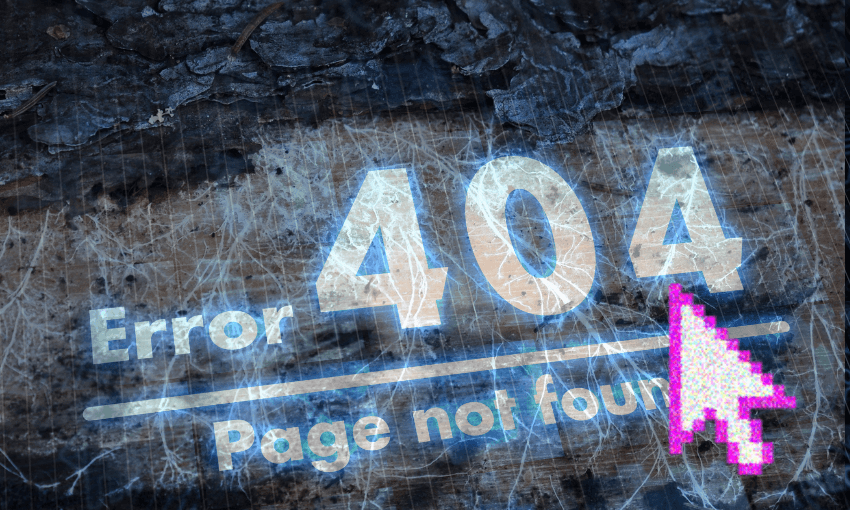The internet seems to be permanent. But all those dead links are a reminder that useful information sometimes only stays accessible when someone is paying for it.
Sometime in the early 2010s, it occurred to my high school teachers that they ought to be teaching us something about how to interact well on the internet. “The internet lasts forever,” I remember being told, with the vague threat that future employers might find my nascent Facebook accounts and judge me based on their contents.
While this didn’t stop my friends and I from uploading dozens of pictures of us attending the school ball, eyes shining red from the flashes of our little point and shoot cameras, it did invest in me a feeling that the ephemeral world of the internet was solid, permanent and unchanging. It was a safe place to keep my photos, words and ideas.
Far from it. It’s all too easy for the internet to disappear. Perhaps this is particularly noticeable because I work in digital journalism, where your work can easily dissipate into the digital ether if someone stops maintaining a domain. The term for this is linkrot, the language of organic things applied to sterile servers.
Take thewireless.co.nz. The website, founded in 2013, was an effort from RNZ to engage youth audiences. It employed journalists who covered the mental health crisis, the impact of inaccessible housing on young people, sexual health and more, publishing a great range of longform and shorter articles. It closed in 2018, with most of the content migrating to the main RNZ website. RNZ didn’t keep paying for the domain, even for a redirect to the main website.
Even though the content is preserved (if you know what to look for), any links that were made to the website on RNZ or elsewhere now display a series of seemingly AI-written content made to get search results with titles like “What month is winter in New Zealand” and an email to contact for potential advertisers. That the website will be getting regular, if not high volumes, of visitors from those old links is surely why the new owner bought the domain.
The National Library’s digital archiving service does an amazing job preserving what New Zealanders are doing online; they save everything with the .nz domain using a webcrawler once a year, and also collect social media records under particular topics; they hired a specific archivist to collect digital documents recording life under the Covid lockdowns, for instance. Members of the public can also suggest digital records that could be preserved. The National Library keeps several separate, secure servers at multiple locations to preserve this information and have multiple failsafes.
Digital records at the National Library are a great resource, as is the Internet Archive’s Wayback Machine, which shows previous versions of websites and the date they were captured. Useful, say, to compare what slogans and imagery political parties have used on their websites over time, or to find a particular article that you remember reading in 2017 but whose publication has ceased to exist. However, having to specifically look for information on a separate service is more than most people bargain for when they click a link.
Another example of information that has disappeared is the Auckland City Libraries website, which was used before Auckland’s councils merged in 2010. I was looking for a blog post link to a piece on the library website about themed street names a few weeks ago. I found that the website now has a bunch of gambling ads and some limited information about library opening hours. There are dozens more examples of how information that is useful to the public – and, as in the case of The Wireless and the city libraries, paid for by the public too –- can disappear when websites change. I’ve seen tantalising previews of route descriptions of walks near train stations in the Wairarapa in search results disappear when you click the link, or a Wikipedia link to the Newshub website evaporate because the domain name automatically redirects to Stuff and the link wasn’t archived.
The phenomenon of linkrot raises larger questions about how we navigate the information of the internet. It’s certainly frustrating to not be able to find something you’re looking for – but contrary to my teacher’s fears of digital permanence, there’s something freeing about making my earnest teenage blog private, or knowing that my early forays into journalism at the uni student magazine have disappeared. Before the age of ubiquitous digital information, there would have been no expectation that writing printed on paper and distributed to a limited audience would have remained accessible to everyone forever.
But the ephemeral nature of the internet is a loss, too, because so much of how we live and interact now is online. Having easy access to information about the place you live is important, and while it might cost money to keep paying for domains or digital storage, doing so gives information a place to live outside of for-profit social media.
In a way, my high school teachers were right. The internet is forever, but only if someone else can profit from the information staying there. Perhaps I’ll rue those enthusiastic photos of myself, aged 14, at the school dance when the AI team at Meta finally finds a way to use my likeness to create hyper-personalised ads. I’d much rather the essay I wrote for a Tumblr literary journal, aged 19, remain instead, but it’s long gone.
In the grand scheme of things, every human idea might one day fade; but in the short term, it seems absurd that Google preserves snippets of what used to be on a website and sell advertising on the search results, even though the ability to read and see it for yourself is gone. That’s bad for journalists right now – but when social media is the only place to look for information and the links have disappeared, it’ll be bad for everyone else too.

